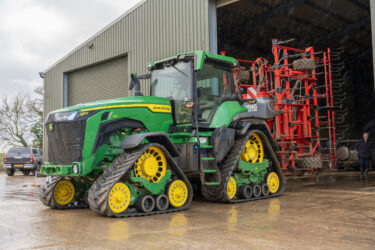The Barleymow’s – episode 17

Diversification: VAT
David is at the kitchen table looking at paperwork, George is snoozing in a nearby armchair. Henry walks in …
Henry: What’s all this, son?
David: These are the preliminary architect plans and drawings for the old barn.
Henry: So, what are the options?
David: Well, it’s all subject to planning permission, but if we’re lucky we could get full residential use, a holiday let, as well as commercial use. But I really don’t know the best way to go here. The costs of each will vary as will the income earning potential, but we also need to consider VAT …
Henry: Is that going to be a problem?
David: Having spoken to Ensors it all depends on which route we take as to the VAT position.
George (stands up with a groan): Surely we’d get the VAT back? We once stored hay in that old barn which is about as rickety as me nowadays! Why can’t we just say any works we do, are repairs to an old farm building and then claim it back?
David: It’s all about the future intended use of the barn Grandad, not its past …
Henry: But if we let the buildings we’ll have to charge VAT. Wouldn’t we then be able to get the VAT back on our conversion costs ?
David: It’s complicated as each option has a different VAT outcome. If we convert to residential use and then let it, we’re not able to charge VAT on the rentals. Residential lets are known as an ‘Exempt Supply’ which means VAT isn’t charged and we’re unlikely to be able to recover any VAT on the costs of converting the property. There is one advantage as we’d be converting an old non-residential building into a residential building, a building contractor will be able to charge us only 5% VAT on his invoices rather than the usual 20% …
Henry: That’s not too bad, but isn’t this still a cost which needs to be factored into our building budgets?
David: That’s right, Dad. However, if we convert and use it for holiday lets, then the VAT position changes. As the partnership is already VAT-registered for our farming business, if we let the barn as holiday lets, then we must charge VAT on the letting income whatever. The advantage is that we can then recover all of the VAT on the conversion work and on all future running costs.
George: Sounds all right, but wouldn’t that mean we’d be viewed as expensive to holidaymakers if our charges have VAT on top?
David: Maybe. Alternatively, we could reduce our VAT-inclusive rental charges to be more in line with competitors, but we’d then lose out. This is a factor to consider though, we shouldn’t forget there’s a major advantage in being able to recover VAT on the conversion costs which could amount to a lot of money …
Henry: So, what’s the position for commercial letting?
David: This is where it gets a bit tricky. The basic principles are that the commercial letting of buildings is exempt from VAT, so we wouldn’t then be able to recover any of the VAT on the conversion costs and this would be charged at the 20% rate for this type of conversion, rather than 5% on a residential conversion. There’s one other point; buildings let for storage are automatically treated as being subject to VAT which would allow us to get the VAT back on the works, as we must charge it on the rentals – but we are not looking at this for this particular building.
George (irritated): We can’t afford to suffer that VAT cost. This would be huge. Might even make the project unviable …
David: Well, providing certain conditions are met we can make what is known as an ‘Option to Tax’ election over the building. This must be lodged with HMRC which makes all future supplies of the building subject to VAT and that would extend to both future rental income and sales of the building.
Henry: Would this allow us to get all of the VAT back on the building works?
David: Yes! As we’d then be charging VAT on the rental income, we’d recover all of it.
Henry: Hmm, there’s a lot to think about. Anything else from a VAT standpoint?
David: Well, if we wanted to convert the barn for say, Grandad to live in, there’s more to consider. As he owns it and would be converting it into a future residence, it would fall into the ‘self-build VAT’ scheme.
George: What the heck’s that?
David (smiles): Well, the building contractor would still be able to charge 5% VAT on the works but, once the barn is completed and you’ve moved in, you’d then be able to get all of the VAT back from HMRC under a ‘self-build VAT reclaim.’
Henry: Wouldn’t we get that back through the partnership VAT return?
David: No, this has to be a separate VAT claim specific to Grandad…
Henry: OK. Anything else?
David: Well, depending on the extent of our rental income that is exempt from VAT, and also upon the costs that we incur on those properties generating that income, we may not be able to claim any of the VAT on costs towards those properties. Plus, we would actually lose some of our VAT on our general overheads under what is known as ‘VAT Partial Exemption.’ There is an annual limit of £7,500 of VAT which we can claim on costs for these exempt supplies and if we are within that we should be okay, but if we exceed that we lose all of the VAT. This would just need some careful planning if it came to it.
Henry: We need a meeting with Ensors!
David: Yes, the whole VAT thing is complicated and what I’ve said is just the tip of the iceberg. Depending on our decisions over the barn, the details will need to be drilled into before we commit one way or another. George: Well go on then lad, give Ensors a call!

